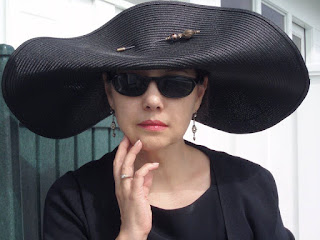Feb 6, 2020 - The Berkeley Times, Wyndy Knox Carr, Knox Book Beat --
Linda Watanabe McFerrin’s Navigating the Divide: Selected Poetry and Prose is mostly emotive and sensual “creative non-fiction,” with short stories and pieces of her sexy zombie thriller, (yes, really), Dead Love, brought in for good measure.
Linda joined the Berkeley Poets Cooperative in 1984, headed by Gail and Charles Entrekin, whose “love permeated their poems and filled the space around them,” she said in her introduction, “One Door Closes.” “I can see why the Co-op thrived for all those years… the sessions were thrilling – full of risk and dread and elation. Charles and Gail were the perfect hosts…Everyone was opinionated. Not a lesson was wasted.”
Even though she turned to writing more prose than poetry eventually, Linda used those workshops to become a truly gifted writer, editor, coach and mentor; also hosting the fabulous and useful Left Coast Writers’ meetings at Book Passage bookstore in Corte Madera first Monday evenings of every month.
 | |
| Charles and Gail Entrekin |
Navigating is a tasty smorgasbord of Linda’s work, varying from profound and insightful coming-of-age sections of Namako: Sea Cucumber, The Hand of the Buddha short stories and poetry to her entertaining and enlightening parts of Dead Love and her excellent travel essays. She slides from ruthless gangsters in fancy taxis to six-year old Tina casting “the vague shape of her longing” up to her Grandmother in heaven to searching out Shinto shrines and kami “folk deities” to Tamara pouring “Jack Daniels in a Dixie cup” when “She was moving toward some sort of crisis and she didn’t like it” with editor Ted’s “all-powerful masculine vortex.” Just on the edge of too-funky, her ear for dialogue, brushstroke character-definition and succinct metaphors pull us on:
Compared to Selita, Terrell’s “other girlfriends” were “like a closetful of cheap nylon nightgowns, they seemed only marginally alluring and infinitely replaceable.” (p. 70) Describing her father prepping dinner, he’s “Standing at the counter with one of Ineko-san’s blue aprons wrapped around him”…”making a big mess with a huge pile of shellfish, moving back and forth between counter and stove, cutting the heads off shrimp and slipping them out of their wafer-thin jackets of exoskeleton, pulling off funny blue veins, then rinsing them in a colander. They were shiny and grey, with big heads festooned with antennae and a pair of beady, accusing black eyes. It was actually the first time I realized that shrimp had heads,” (p. 46) and then, from “Something to Rave About,”
“In the kitchen, two tall women with red hair stood at an enormous industrial stove, stirring soup. They looked like twins. Both wore short black cocktail dresses, chef’s toques and threateningly pointed, six-inch stiletto heels that made them appear taller still. The chef’s toques were stiffly starched columns topped with a poof that made them look like they had their red heads up in their respective clouds.” (p. 297)
 |
| Linda and Joanna Wandering in Paris! |
Her eye for detail, sense descriptions, contemporary male-female relationships and the pleasures and perils of travel and family life; especially as a Welsh-Japanese-American, are second-to-none. Her “genres, cultures and points of view” kaleidoscope from her Grandmother’s tiny traditional town life in rice-paddy Japan to “right-now” super-urban Tokyo, Opium Wars and Cultural Revolution Shanghai from 1884-to-present and “the 96th Avenue Baptist Church.”
Exorbitant, rebellious and admitting to anything; good, bad or downright evil, Watanabe-McFerrin is a new voice sprung from Old Berkeley coming forward to be reckoned with.

